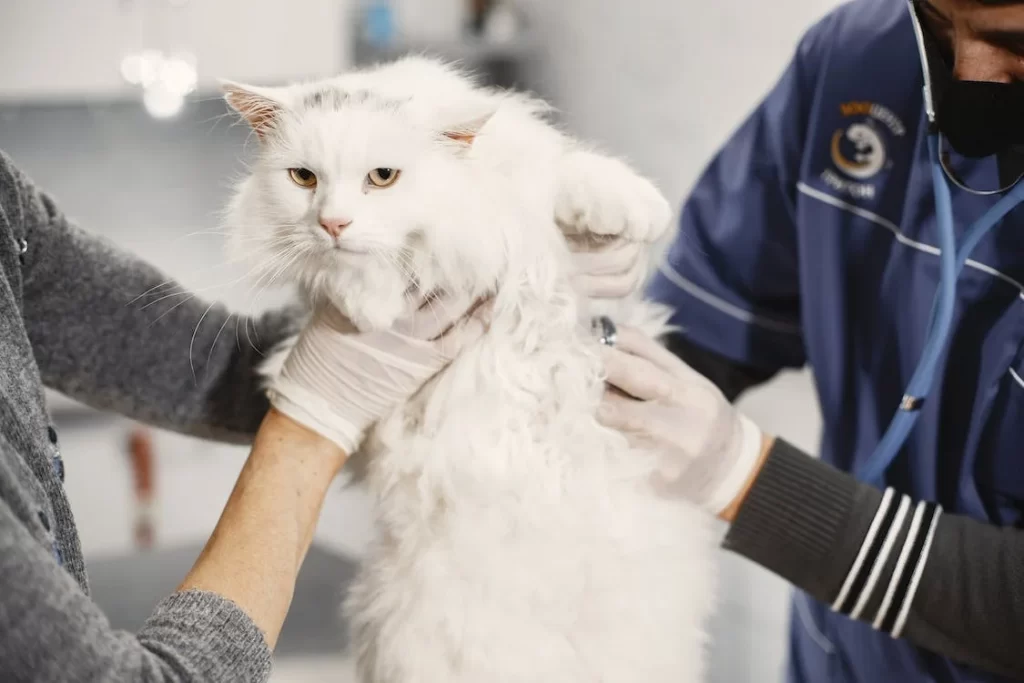Last updated on February 19th, 2023 at 12:39 am

If you’ve ever suffered from a urinary tract infection (UTI), you understand how painful it can be. On the other hand, cats are adept at concealing their issues, making it difficult to diagnose a UTI in a cat if you do not know what to look for. In addition, some cat owners hate providing their cats with medical treatment, such as confined cages, medicines, or invasive operations. This sparked the usual question, “Are there any cat urinary tract infection home remedies?” Are UTIs a condition unique to humans?
As you may be aware, cats’ urinary tract infections (UTIs) can severely affect their quality of life. Since your cat cannot speak with you, we will discuss the frequent symptoms of a urinary tract infection in cats so that you can swiftly diagnose and treat the condition. In addition, we will discuss several natural remedies you can employ to help your cat recover from the infection.
[toc]What is a Cat Urinary Tract Infection?
A cat urinary tract infection (UTI) is a bacterial infection that affects the lower urinary tract of cats. UTIs are quite common in cats, and can cause irritation and discomfort. Symptoms of a UTI can include frequent urination, pain or difficulty urinating, bloody or cloudy urine, and/or an increased frequency of grooming in the genital area.
The most common cause of a UTI in cats is bacterial infection, which can come from environmental sources such as contaminated water bowls, litter boxes, and from contact with other cats. In some cases, a UTI can be caused by a disease process such as feline lower urinary tract disease (FLUTD) or a urinary blockage.
If left untreated, a UTI can lead to more serious health problems, including kidney infection, bladder stones, and even death. Therefore, it is important to seek veterinary care if you suspect your cat has a UTI. Treatment for a UTI typically involves antibiotics, which can take several weeks to take effect. Additionally, your vet may recommend lifestyle changes to help prevent future UTIs, such as increasing your cat’s water intake, providing a clean litter box, and avoiding stress.
Symptoms of Cat Urinary Tract Infection
Now that you know what UTI in cats is, how can you tell if your cat has a urinary tract infection? Cats can develop various urinary disorders, so confirming your cat’s UTI symptoms is necessary before beginning any treatment. Here are the symptoms of UTI to look out for:
- Frequent and/or painful urination: Cats with urinary tract infections may experience pain and discomfort when urinating, and may attempt to urinate more often.
- Straining to urinate: A cat with a urinary tract infection may strain to urinate as they have difficulty passing the urine due to the pain and inflammation.
- Blood in the urine: Blood in the urine is an indication of a urinary tract infection.
- Excessive licking of the genital area: Cats will often lick or bite the area around their genitals as a result of the pain and inflammation of a urinary tract infection.
- Foul-smelling urine: The smell of the urine may be stronger and more foul-smelling than usual.
- Lethargy and decreased appetite: Cats with urinary tract infections may be less active than usual and may not eat as much as they used to.
- Crying out in pain when urinating: Cats may cry out in pain when attempting to urinate due to the inflammation and discomfort of a urinary tract infection.
Consult your vet to diagnose and treat your cat’s urinary tract infection (UTI). If your cat exhibits even a couple of these signs, it likely has a UTI, and you may start giving it a natural home remedy to help reduce the pain. Your cat’s UTI can be effectively treated and managed with home treatments, but you should also seek medical attention. Remember this before trying any home remedies. UTIs cause a lot of discomfort for your pets. For this reason, we must always seek out means of enhancing their development.
What Are Some Cat Urinary Tract Infections Home Remedies?
Once you’ve confirmed that your cat’s symptoms are consistent with a UTI, you may begin treating the problem with one of the cat urinary tract infection home remedies listed below. You can start wherever you like and even mix these remedies with some medicine provided by your vet to assist your cat in recuperating rapidly.
Make Sure Your Cat Has Access To Plenty Of Water
One of the best ways to keep your cat’s urinary tract healthy is to ensure that he has access to plenty of fresh, clean water. Water helps to flush out bacteria and toxins from the bladder and can help to reduce the risk of UTIs. If your cat is still not drinking enough water, try adding ice cubes to the bowl or providing it in several areas. Who doesn’t love a bit of cold water, right? In addition, investing in a gentle water bowl on their whiskers is a must.
Avoid Stressful Situations
Stress is one of the greatest health culprits of all. People and cats react to anxiety in remarkably similar ways. Long-term inflammation in the body is caused by stress if it is not handled. Irritation of the bladder, bladder infections, and other health issues are possible results of this stress. Maintaining a low-stress environment for your cat can help prevent several health problems.
Simple strategies to relieve stress in cats include providing them with a quiet space separate from the rest of the household’s noise and activities. Make sure they have a place to hide, if necessary, comfy bedding, a scratching post, water, and a litter tray if essential in this location.
Also, provide regular exercise which can help to keep the bladder and urinary tract healthy. This can be achieved by providing your cat with plenty of toys and activities to keep him active.
Provide A Clean Litter Box
Cats are very fastidious, and they will not use a litter box that is not clean. Make sure that you scoop out the litter box at least twice a day and use a litter with low dust levels.
Changes in Diet
After treating any infection, your cat’s best long-term home treatment is to adjust its food. It is essential to repeat the urinalysis to ensure that the infection has been treated and then take note of the pH. If the pH is too low, your cat may be generating oxalate crystals that irritate the bladder and cause reinfection. Your cat may be developing struvite crystals if the pH is too high.
Several excellent cat meals without a prescription adjust the pH and make it acidic. However, your cat will require a prescription diet if the pH is too low. Other meals ideal for obligate carnivore cats include freeze-dried or raw foods. Cats in the wild obtain the majority of their water from the live food sources they consume. Because of the high water content, canned cat food is a great way to ensure your pet gets enough fluids. Moisturized cat food is easy to feed to a cat that refuses to drink water. Choose canned cat food over dry if you want to ensure your domesticated cat gets enough water daily.
Chondroitin and Glucosamine
Cats are frequently given glucosamine and chondroitin supplements to keep their joints healthy and supple as they grow old. However, it has been shown that these beneficial nutrients can also aid with FLUTD or feline lower urinary tract illness. When paired with chondroitin, glucosamine’s anti-inflammatory properties can significantly protect the lining of the bladder. This may help your cat feel better while facilitating a speedier recovery from the urinary tract infection (UTI).
The Juniper Berry
This herb has also been proven effective at reducing inflammation, which can help lessen your cat’s discomfort and agony caused by UTI. Furthermore, juniper berries can destroy antibiotic-resistant bacteria and fungus, assisting in the complete elimination of any UTI your cat may be having.
Apple Cider Vinegar
Apple cider vinegar is an all-natural remedy for several health problems in cats, including UTIs (UTIs). Apple cider’s high acidity can be beneficial to your cat’s health by preventing the formation of bacteria in the urinary tract. Overdosing on it could be harmful, so it’s best to keep the consumption to a minimum. This may lessen your cat’s present UTI symptoms or even cure them entirely. Remember that you should never offer your cat undiluted Apple cider vinegar; instead, dilute it with water before giving it to your cat.
Cranberries
According to Dr. Maureen, Cranberries contains compounds, which help prevent bacteria from sticking to the walls of the urinary tract, which in turn can help prevent infections. It can lower the pH of your cat’s urine, which can help cure and prevent UTIs. Aside from that, you can be sure that it is safe and beneficial as there are proven studies that cranberries are excellent for treating UTI and feline idiopathic cystitis. It’s important to note that you should test your cat’s urine pH level before giving it cranberry and only give your cat cranberry supplements if his pee is overly alkaline.
Leaf Parsley
Give your cat a few parsley leaves to chew on to encourage it to drink more water. However, the benefits of using this plant are not limited to that. In addition, it helps fight off bacteria and acts as a diuretic. It will make your cat urinate more often, which will help rid its body of the sickness. However, it can also aid in healing by destroying the germs in your cat’s urinary tract.
Marshmallow Roots
According to WebMD, Marshmallow root can help fight a UTI by killing germs, reducing inflammation, and strengthening the bladder lining. It also acts as a diuretic (a medicine y that helps the kidneys flush out urine or other fluids), increasing urine flow and flushing the bladder.
Bone Broth
Bone broth is a tasty and nourishing option for keeping your cat hydrated. Bone broth not only provides much-needed hydration, but it also contains anti-inflammatory and healing elements and minerals. Bone broth contains amino acids (organic chemicals that make protein in the body), including glycine and arginine, which have been proven to decrease inflammation.
Echinacea
Echinacea is used to treat a wide range of human health problems. Nonetheless, your cat may benefit from it just as much. It is widely employed for treating various illnesses in cats, most typically those of the upper respiratory system. Due to its antimicrobial properties, a small amount may help alleviate your cat’s UTI symptoms. Don’t worry; VCA made it clear that it is safe but should still be used cautiously. For example, please do not use it on cats allergic to it and pets with autoimmune disorders, pregnant, or nursing.
Nettle
Nettle is frequently used in the treatment of urinary tract infections in humans. However, this helpful herb can assist if your cat contracts this nasty infection. It can aid in removing bacteria that aren’t wanted in the body, reducing pain and possibly even relieving irritation in the urinary tract. As a diuretic, it encourages you to urinate more frequently, which helps flush your system.
When Should you Consult a Vet?
When a feline family member contracts a urinary tract infection, you must do all it takes to get them well again. You can do several things to protect yourself from getting a UTI in the future, but the two most important are staying well-hydrated and eating healthily. The most effective treatment is prevention, though. It’s worth a shot to try these remedies if your cat only has subtle symptoms. Minor cases of cat urinary tract infections may benefit from home cures and therapies, but severe cases require the attention of a veterinarian.
Your vet may prescribe antibiotics that kill off harmful germs. Some of these medications can be taken daily to prevent future episodes of UTI. Be sure to measure your cat’s urine pH before initiating treatments to ensure you aren’t making the situation worse. Veterinary assistance should be sought if the symptoms are not alleviated within a few days. Take your feline companion to the vet immediately if you see any pain or inability to urinate. This could signify a urethral obstruction, which is fatal if not treated within the next 24 to 48 hours.
Conclusion
Seeing your pet in pain can be stressful. As a result, you need to know how to avoid getting a UTI. Keeping your cat well-hydrated is one way to fight off the virus. Do not hesitate to take your cat to the vet if you notice any severe symptoms, such as blood in the urine.
We hope this information has shed some light on what a UTI is and how you might treat your cat’s infection. Many home remedies for cat UTIs can be used instead of traditional, potentially harmful treatments for infections caused by bacteria, fungi, parasites, or crystals. To treat your cat’s UTI, you should always check with your vet first.


